Search
Showing 10 of 1803 results for NARSC 2016 July student registration fees
-
Around the world in five
Asia
More Tamil Nadu State students from middle class families plump for higher studies abroad
More students from India, including middle-class families, are now eager to study abroad as COVID-19 restrictions ease. Popular courses include engineering, management, and medicine, with countries like the UK, Canada, Russia, and Kazakhstan being preferred destinations. New visa rules in the UK have caused some concern, leading students to consider Australia and New Zealand as alternative options.
North America
Agent role to be reviewed in Canada’s new international education strategy
Global Affairs Canada is concerned about the vulnerability posed by education agents in Canada's international education sector, as they engage in unethical practices that could harm the country's reputation. The upcoming strategy will also prioritize diversification of programs, destinations, and source countries to spread economic benefits more equitably and reduce reliance on specific markets like India and China.
South America
Argentina's agency sector optimistic on future growth
Argentina's outbound study travel sector is optimistic about future growth, with 85% of ARSAA (Argentine Study Abroad Association) members expecting travel in the upcoming quarter. Challenges such as affordable flights, payments, and school communication highlight the need for improved solutions to support Argentine students studying abroad.
Europe
UK to block dependants from accompanying international students as of January 2024
The UK government plans to restrict dependents from accompanying international students, except for those pursuing postgraduate programs with a research focus, starting January 2024. This policy aimed at controlling net migration has sparked worries among prospective students planning to study in the UK.Africa
South Africa's ELT schools hopeful after further recovery in 2022
Education South Africa (EduSA) schools saw a 44.2% increase in international students in 2022, but numbers remained below pre-pandemic levels. Saudi Arabia and Brazil were top source markets, while African markets showed promising growth. The association plans to focus on branding, marketing, and digital development in 2023 to further enhance their international profile.
-
Aotearoa welcomes New Zealand Schools Scholarships students from Viet Nam
14 high-achieving Vietnamese students will be arriving in Aotearoa New Zealand over the next few months to take up school placements across the country from Kerikeri to Upper Hutt, from Ōtūmoetai to Manawatū.
NZSS is the flagship initiative under the Aotearoa New Zealand School Sector Strategy in Viet Nam. It was launched in 2019 and is exclusively offered to Vietnamese students from Grade 8 – 10. Since its launch NZSS has grown to become a prestigious, top of mind scholarship for local students.
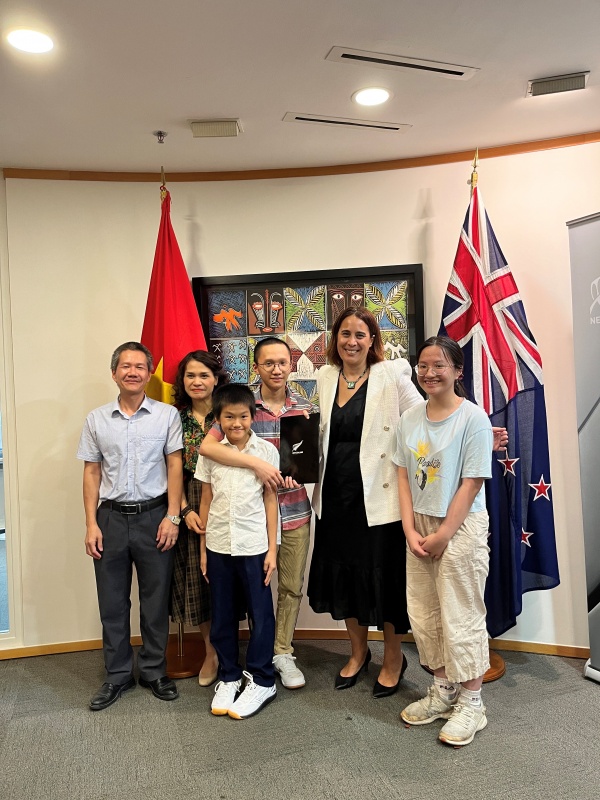
Nguyen Huy could not make it for the in-person Awards Ceremony in HCMC, so we arranged a special meet-up for his family at the Embassy in Hanoi with Ambassador Tredene Dobson, who awarded him with the NZSS certificate.
ENZ’s Business Development Manager, Mary Camp said that the scholarship programme not only offers talented Vietnamese students the opportunity to experience our country’s world-class education but also brings new perspectives and ways of thinking to Kiwi students as they learn alongside international friends.
“Schools in Aotearoa New Zealand are excited to welcome these top scholars from Viet Nam. Previous scholarship winners have had great academic success, made valuable contributions to their schools in NZ, and have gone on to attend top quality universities in NZ and internationally” added Mary.
This year’s award winners were celebrated at a ceremony on 18 June in Ho Chi Minh City where H.E Tredene Dobson, New Zealand Ambassador to Viet Nam opened the awards ceremony and pre-departure briefing and congratulated all the students.
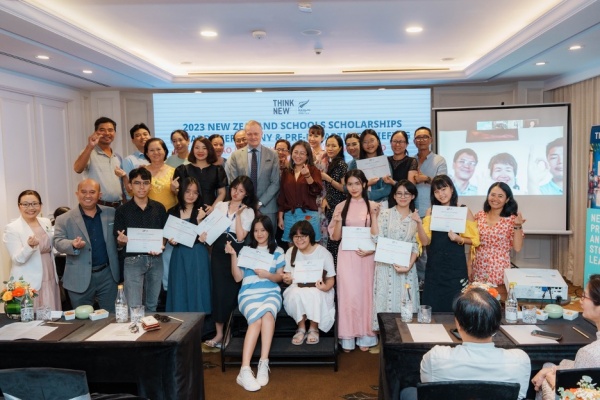
ENZ’s market manager Van Banh (far left) and Guy Lewis, Consular, NZ Embassy in Hanoi, with NZSS award recipients and family members at the awards ceremony and pre-departure briefing.
ENZ’s Regional Director for Asia, Mr Ben Burrowes also congratulated the students via video link and said it was fantastic to have a range of ex-scholarship winners and parents join us to share their tips and advice to this year’s winners.
“ENZ is absolutely committed to its relationship with Viet Nam and we are excited to welcome the NZSS recipients this year. The NZSS programme is designed so that more Vietnamese school students can access a world-class New Zealand education experience. As we saw pre-COVID, the NZSS recipients received the highest quality education and care while they were in New Zealand and that will certainly continue in 2023,” said Mr Burrowes.
A special thanks goes to the VSANZ - Vietnamese Students' Association in New Zealand for its President's presentation on the Pre-Departure Checklist and the NEW tips.
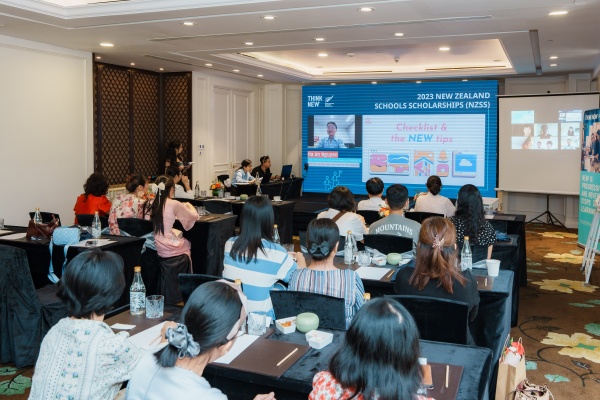
Ms Ha An Nguyen, President of VSANZ, shared useful tips for NZSS students to get well-prepared for the new learning journey in New Zealand.
We wish these students the absolute best for an exciting and rewarding study experience ahead as they start school across the country this week and in the coming months.
-
Hands-on agribusiness experience for NZ students in Brazil, Chile and Colombia
Despite being located on opposite sides of the world, New Zealand and Latin America have very similar climates, a phenomenon which serves as an opportunity for students in professions connected to agriculture to broaden their knowledge and practical skills. The Prime Minister’s Scholarship programme has supported students travelling to Brazil, Chile and Colombia to study this subject.
In operation since 2013, the Prime Minister’s Scholarship programme has already provided support for around 3,050 New Zealanders studying abroad, covering their travel, meals, accommodation, studies, technical visits, and journeys in different regions.
In 2022, Brazil was the most popular Latin-American country among group scholarship recipients, receiving visits from three groups. Brazil was also the first country to welcome New Zealand students from the program following the COVID-19 pandemic.
12 members of the Agronomy and Business Faculty of Lincoln University travelled to São Paulo in November last year. Over the course of five weeks, they visited and studied at three Brazilian universities, visiting farms and production centres in São Paulo, Minas Gerais, Paraná and Santa Catarina states.
According to Dr. Hugh Bigsby of Lincoln University, who coordinated the groups of students, their visits were organised so they could learn about the countries and their cultures through their food.
“Our programmes are called ‘agribusiness summer schools’ and the aim is to try to understand the local economy, over a period of five weeks, through processes involved in food production and the textile industry, for example,” Hugh said.
“In each country, we introduce the students to farms, sales chains and supermarkets. At the end of the program, they are required to present a business idea that can contribute to the commercial relations between New Zealand and each country visited, supporting exports and imports,” explained Hugh.
Amongst the places visited in Brazil were the Higher Education School of Agriculture of the University of São Paulo, in Piracicaba; the Faculty of Agrarian Sciences of the Federal University of Paraná, in Curitiba; and the experimental farms operated by the Federal University of Viçosa.
“The partnerships with the local universities of each country are fundamental to the success of our program, since each of them provides us with the local economic context, demonstrates technological advances that are underway, and explains the specific features of the local producers,” Hugh said.
At the same time, a group of 10 students, from the School of Agriculture and Development at Massey University, were in Chile to pursue their studies of agribusiness techniques. The students explored several regions across the country, visiting the Austral University of Chile, the Catholic University of Valparaiso, and Magallanes University in Punta Arenas.
In addition to the universities, the students went to the Santiago Botanic Gardens, dairy cattle farms, vineyards, avocado plantations, and food cooperatives.
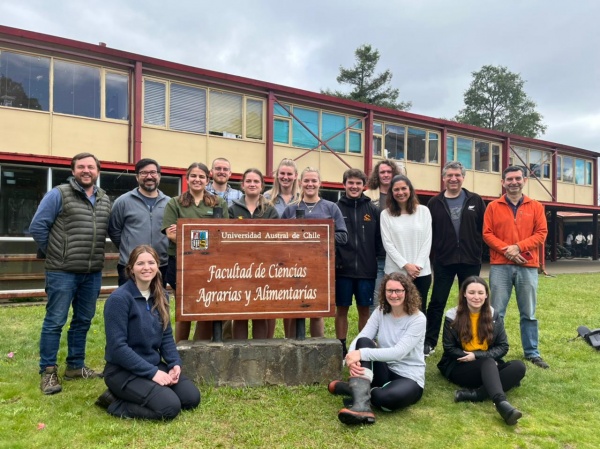
Massey University students at Universidad Austral de Chile, in Chile.
Massey University Professor Ignacio López, accompanied students on their visit. He said the trip was an incredible experience.
“The students were impressed with how the farmers are capable of sustainably farming foods in extremely harsh conditions” Ignacio said.
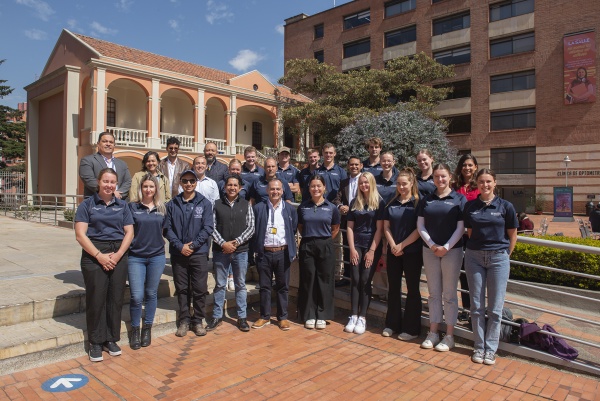
Lincoln University students at Universidad de La Salle, in Colombia.
A group of 20 students from the Agronomy and Business Faculty of Lincoln University travelled to Bogotá, Colombia, in January to study agribusiness. They were in the country for four weeks, studying at the La Salle University, located in the Colombian capital, and at Manizales University.
The students learnt about the wide range of agribusiness activities conducted in the country and in the Mercosur region, including detailed studies of Colombian coffee production techniques, which are considered a benchmark across the world.
The students from the three groups all returned home having recognised the creativity and experience of the Latin-American agricultural producers.
“For our students, the trip opened their minds to new possibilities and different ways of working with agriculture,” said Ignácio Lopez.
“They also realised that what they had experimented with can, indeed, be adjusted and applied in New Zealand” he said.
-
ENZ discontinues recognised agency programme
The decision followed a global review that included input from NZ education providers, education agents globally and NZ government agencies. It also considered practice across other jurisdictions and the global education agent landscape in a post-pandemic environment. The decision becomes effective immediately. The review was foreshadowed in the refresh of the New Zealand International Education Strategy in 2022.
“There are many positive aspects of our engagement with agents,” said General Manager of Sector Services, Sahinde Pala.
“Our global staff network and trusted relationships with agents are important factors in assisting students who wish to further their studies in New Zealand. ENZ’s AgentLab platform has also been a rich resource and information hub for education agents, particularly during the pandemic. We will continue to offer these services going forward.”
“But there were also issues. Our review showed that many successful agents did not see the value in joining the programme. The programme was also not accessible to emerging education consultants and organisations, and it did not meet the needs of New Zealand education providers.”
“After careful consideration of the feedback from many agencies and New Zealand education providers, it became clear that the existing programme was not fit for the emerging environment and the decision was taken to discontinue.”
“Looking forward, we want to ensure a more even-handed and efficient approach and feel the best way of achieving this is to open up the power of our international network, along with our information and training capability to all agents, regardless of their size, expertise or capability.”
While the ENZRA programme will cease, the new AgentLab platform will be launched in August and will include a wide range of updates relevant to education agents, including a calendar of events, details of upcoming webinars, resources, and latest news and updates from across the New Zealand education landscape.
Education agents will be able to access the same level of information and resources via the AgentLab platform. The discontinuation of the ENZRA programme will not affect this.
Any agent seeking more information or support should email: agent.help@enz.govt.nz
For further information:
Sai Raje | Senior Advisor Communications, Education New Zealand
+64 21 479 649
Notes to Editors:
About Education New Zealand (ENZ) https://www.enz.govt.nz/
Education New Zealand Manapou ki te Ao (ENZ) is the government agency responsible for taking New Zealand’s education experiences to the world. ENZ promotes a New Zealand education as one that teaches students to be critical thinkers, problem solvers and lifelong learners, which will help them succeed in their future careers and create a positive impact on the world.
With approximately 100 staff in 18 locations around the world, ENZ works closely with New Zealand’s diverse education sector including schools, English language providers, Private Training Establishments, Te Pūkenga (Institutes of Technology and Polytechnics), universities; and internationally with NZ Inc agencies, Government agencies and education providers to encourage sustainable growth and identify opportunities.
-
All Covid-19 requirements removed

Changes that take effect from Tuesday 15 August 2023
- Confirmed Covid-19 cases will no longer be legally required to self-isolate
- Masks will no longer be mandatory in any locations
This means that tertiary education providers can operate as normal, and set their own policies and procedures to ensure they meet their obligations to staff and learners, including under the Health and Safety at Work Act 2015, and the Education (Pastoral Care of Tertiary and International Learners) Code of Practice 2021.
Advice for tertiary providers and students
The Ministry of Education recommends that tertiary education providers follow COVID-19 health advice, and support staff and learners to do so.
Full COVID-19 health advice can be found at: Unite against COVID-19.
The Ministry of Education will also be updating advice for tertiary providers and students on the Te Mahau COVID-19 website following this announcement.
The latest health advice on COVID-19 includes:
- Stay at home if you are feeling unwell - if you, or someone in your household develops one or more of the following symptoms, you should take a Rapid Antigen Test (RAT) for COVID-19: a runny nose, sore throat, cough, fever, vomiting, diarrhoea, headache, loss of smell or taste, shortness of breath.
- If you have tested positive for COVID-19, it is recommended you isolate for 5 days, even if you only have mild symptoms, starting at Day 0, which is the day your symptoms started or when you tested positive, whichever came first.
- If you do need to leave your home during your 5-day isolation period, it is very important you take precautions to prevent spreading COVID-19 to others. You should wear a mask whenever you leave the house. You should not visit a healthcare facility (except to access medical care), an aged residential care facility, or have contact with anyone at risk of getting seriously unwell with COVID-19.
- If you are in isolation at the time of the setting change announcement, we recommend you continue isolating until you have completed 5 days. If you have already been isolating for 6 or 7 days, and are well, you can return to your normal activities.
- After completing 5 days isolation –
- If your symptoms have resolved and you feel well, you can return to your normal activities.
- If you still feel unwell, we recommend you stay home until you have recovered.
- We recommend you wear a mask if you need to visit a healthcare facility or an aged residential care facility, or you have contact with anyone at risk of getting seriously unwell with COVID-19 up until 10 days after your symptoms started or you tested positive. This is because some people are infectious for up to 10 days.
Mask wearing remains an important way we can prevent the spread of respiratory illnesses
Free masks are available for pick up with free rapid antigen tests (RATs) from participating collection sites.
RATs will remain free for everyone throughout 2023
You can find out participating pick-up points for RATs and masks at COVID-19 Testing • Healthpoint or by calling 0800 222 478 and choosing option 1.
The Government's media release can be found here.
-
Thai interest in New Zealand as an offshore study destination is growing
The annual Education New Zealand Manapou ki te Ao (ENZ) Bangkok Fair took place on Saturday 26 August with 1,630 attendees visiting throughout the course of the day, a record number for the Fair.
Those who attended had the opportunity to talk to more than 50 education providers that were representing Aotearoa New Zealand education across the school, vocational, English language, and university sectors.
Ben McNally Burn, ENZ’s International Market Manager for Southeast Asia & India added that it was fantastic to see Thai interest in considering Aotearoa New Zealand as an offshore study destination growing.
“Having record numbers attend our Bangkok Fair this year demonstrates how important and reputable these fairs have become for prospective parents and students wanting to access reliable information directly from New Zealand education institutions.
“For our education partners, these events are so important for maintaining in-market credibility and reputation and we cannot underestimate the importance of keeping New Zealand front of mind. Especially in amongst accelerated competitor activities in Thailand including seminars and fairs hosted by Education USA, the Canadian Embassy, Austrade, and the British Council”, said Ben.
Ms. Kirsty Bundell, Assistant Director of Mathematics and Statistics at Avondale High School conducted five simulated classrooms to showcase hands-on New Zealand teaching and learning styles. Featured here is a class on Geometry - ‘SURFACE AREA OF 3D SHAPES’.
Feedback from the sector representatives was overwhelmingly positive, noting that not only was there a fantastic turn out of attendees but that prospective students had clearly researched Aotearoa New Zealand and its educational offerings prior to coming, which led to engaging discussions.
Anne Henwood, Director of International Students at Rosehill College in Auckland said that she was thrilled by the exceptional experience at the 2023 Bangkok Fair.
“The events proved to be an invaluable opportunity for New Zealand schools, fostering connections and opening doors to agents, parents and students seeking quality education. The events brilliantly showcased the diverse educational opportunities for Thai students in New Zealand.”
Garry Chronican, Director Pathway, University of Otago | Te Whare Wānanga o Otāgo also said that it was a pleasure to attend such a well-run and valuable event.
“The standard of advertising, communication, organisation and overall experience was outstanding. The events were well supported by education agencies – a testament to the excellent relationship ENZ staff have with local stakeholders”.
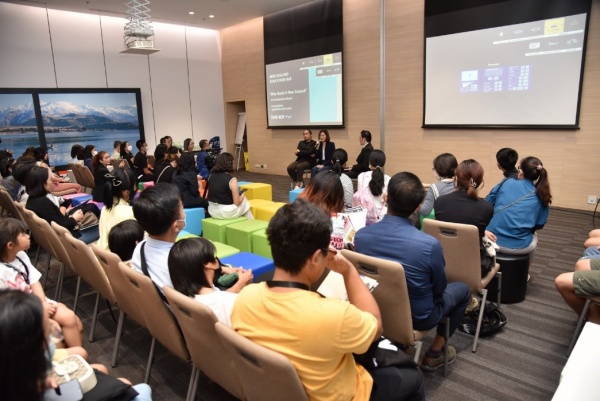
“Why study in New Zealand” special seminar held by key opinion leaders Choak and Suquan Bulakul. Their son is currently studying in New Zealand.
ENZ also delivered an agent seminar in Bangkok on 25 August, just prior to the Education Fair. The Bangkok Agent Seminar offered an opportunity for NZ institutions to reconnect with high performing Thai education agents. This event included market updates, networking opportunities, along with 1-to-1 meetings throughout the day.
Following the ENZ agent seminars and fair, the ENZ team partnered with local schools and agents to take part in three separate mini fairs and school roadshows across Thailand including in Chiang Mai, Phuket and Chonburi.
Any institutions looking to be involved in other ENZ organised fairs and events in the future in any of our markets, can do so by visiting ENZ’s events page here.
-
From the CE: The need to connect remains critical
Kia ora tatou,
This month I want to add some colour, and give credit, to the work New Zealand institutions and the Education New Zealand Manapou ki te Ao (ENZ) team have been undertaking offshore in the continuing drive to raise awareness of NZ education options and opportunities.
I have mentioned before how much of this activity is often ‘unseen’ from New Zealand, and yet it is pivotal to our marketing and outreach to potential students, their parents, agents, institutional and government partners. The principle focus of this effort is to engage with students, build awareness, and drive interest and enrolment in New Zealand education providers. But that is not all. These activities and events, play an important role of ensuring the sector and its institutions remain connected to key international counterparts and government agencies, lifting the profile of New Zealand as a destination for international education while building long term resilience for the sector.
Here is a quick update on some of this International activity. Images of some of these interactions are shared in our international photo gallery update here.
China: Massey University and ENZ organised a Massey University friends and alumni reception in the New Zealand Embassy in Beijing on 27 August. About 50 participants attended the event including alumni and partners of Massey University. The event was particularly timely following China being the Country of Honour at NZIEC Ki Tua earlier in the month and highlights the important linkages between government to government and institutional relationships in key markets.
India: ENZ was a gold sponsor of the IC3 Institute annual conference, held in Hyderabad on 23 - 24 August. ENZ was joined at the event by representatives of seven New Zealand universities and saw strong interest among counsellors in New Zealand as a study destination. More than 2,000 delegates attended the two-day event.
Brazil; Colombia - Latin America: Following on from strong interest shown in New Zealand at the first in person expo at the Australian Centre Expo in Sāo Paulo in August, ENZ’s Director of Engagement Latin America, Javiera Visedo, took the opportunity to reconnect with providers and stakeholders across New Zealand after attending NZIEC Ki Tua. In Auckland, she delivered a market insights session to local ELS and PTE sector representatives highlighting opportunities for growth.
Malaysia: The first instalment of the Indigenous People Talk series took place on 13 August with Dr Hazel Abraham from AUT joining Malaysian academics to discuss the importance of education and technology to empower indigenous communities in both countries.
Indonesia: Universities New Zealand signed an arrangement with LPDP (the Indonesian Endowment Fund for Education) on 2 August in Jakarta. The Arrangement was signed by Prof Neil Quigley, University of Waikato Vice Chancellor and Chair of the UNZ International Committee, and Andin Hadiyanto, President director of LPDP. New Zealand Ambassador to Indonesia, HE Kevin Burnett joined representatives of all eight New Zealand universities to witness the ceremony.
South Korea: In three short days from 31 August to 2 September, the ENZ team organised an Agent seminar, a New Zealand Education night reception and the New Zealand Education Fair. All were well attended and interest from attendees was high.
Thailand: Similarly, in a compressed week from 25 - 30 August, the ENZ Thai Team coordinated Agent seminars, the New Zealand Education Fair in Bangkok, and follow-up school visits and agent fairs in the Thai provinces of Chiang Mai, Phuket and Chonburi.
Vietnam: In the lead up to the New Zealand Education Fairs which will take place in October, the ENZ Vietnam team participated in the GSE Education Fair by hosting a ‘Study with New Zealand’ session on 9 September.
If you are interested in learning more about how your school or institution can participate in building connections with international students, contact our international team through this link.
Within New Zealand, we were delighted to welcome the first cohort of students from Ichihara City to undertake a study tour at Waimea College in Nelson from 6 - 20 August. Reinforcing the importance of the study trip, ENZ’s Lisa Futschek joined the Mayor of Ichihara in Wellington to discuss further strengthening of the Education Cooperation Arrangement with Ichihara City that was originally signed in 2020.
Our sector engagement team continued its briefings of key sub-sector peak bodies to outline the ENZ Annual Plan and how it impacts their sector. This included briefings for the SEIBA Board, QTI and ITENZ, and English New Zealand. This followed briefings early in August with international directors of New Zealand universities and Te Pūkenga. Feedback from the bodies was appreciative of the explanation and sharing of the plan, with questions raised at the briefings a key part of the transparent and helpful feedback we received.
The urgency for the international education sector to address challenges and opportunities of the future continued on from the NZIEC Ki Tua conference in mid-August through to the recent ITENZ conference held in Christchurch on 12 and 13 September. The PTE sector has faced some of the most challenging conditions in recent times, but the determination of those attending to identify and take opportunities to regain their previous strength was impressive and bodes well for the sector’s path to a brighter future.
On the marketing front, visits to the Study with New Zealand (SWNZ) website continued to perform well with the total number of active sessions lifting nine percent to 125,203 during August. Of particular interest was the strong interest from Thailand which overtook India in August as the main source of interest with a spike in activity before and during the Education Fair in Bangkok. As we move through the year, other markets are also expected to show lifts in activity associated with local market fairs and promotion.
This week also saw ENZ host the first Tertiary Education Institution Manaaki Scholarship workshop in Auckland since ENZ took over the management of the scholarships programme last November. The workshop was attended by all eight universities and Te Pūkenga, with support and involvement from MFAT, Manaaki alumni and Skills Consulting Group. The scholarships not only benefit the students, but also the sector who gain access to many international students through this unique programme.
As I look back on this month’s review it is obvious to me that to continue the rebuild of the international education sector for New Zealand the need to connect remains a critical part of the recovery. Whether it is happening in other countries or here in New Zealand, it is important to remember we are a ‘people’ business – we need to get out there and connect. Safe connecting.
He aha te mea nui o te ao? He tangata! He tangata! He tangata!
What is the most important thing in the world?
It is people! It is people! It is people!
Ngā mihi,
Grant
-
Smart cities and AI technology key focus for KIWI Challenge 2023
The competition is designed to inspire youth across Indonesia to be engaged in entrepreneurial activities that address societal issues.
The 2023 theme is “Reforming Indonesia’s mobility and smart cities using AI technology”.
Education New Zealand Manapou ki te Ao (ENZ) organises the competition in collaboration with a New Zealand university and Kopi Tuli (Deaf Cafe), a deaf community in Jakarta. This year, ENZ is partnering up with Auckland University of Technology (AUT) to co-host the initiative.
School groups are required to submit video entries to a judging panel made up of AUT academics and ENZ representatives. Submissions are reviewed by the panel and finalists selected. The students will then be supported through a number of workshops and mentoring by the AUT academics.
The participating academic from AUT is Senior Lecturer International Business, Strategy and Entrepreneurship, Dr Taghreed Hikmet, who has expertise in smart cities and is passionate about mentoring and inspiring young future leaders. She has had close involvement in multiple programmes like YES, where she mentored young entrepreneurs pitching their business ideas.
Dr Hikmet says she is honoured to be involved this year.
“It is a delight to have the opportunity to inspire Indonesian students to think creatively about what the future can look like. The development of smart cities is about improving sustainability, creating opportunities for economic development and enhancing the quality of life for people, I’m looking forward to seeing the ideas students put forward,” she says.
ENZ Director Asia Ben Burrowes says that this initiative showcases New Zealand’s world-class education and academics in a meaningful way.
“Now entering its fourth year, KIWI Challenge has grown into a unique platform for New Zealand and our top academics to remain connected to Indonesian students in a way that is in touch with what matters to them. We continue to work with partners in Indonesia to identify the themes that resonate with students” he says.
The winners of the competition will be announced on Saturday 25 November, the top three groups will be awarded vouchers worth IDR 2,000,000 – 10,000,000.
To date, the competition has attracted more than 1,000 Indonesian students through the programme and each year has showcased a New Zealand university and a particular theme. Previous university partners were Massey University (Tourism), Lincoln University (Agribusiness) and the University of Canterbury (Education Technology).
-
Record audience for early childhood education symposium with China
This year, the symposium attracted a live audience of 350 attendees and a livestream audience of 100,000, well over the number of attendees in previous years. The symposium’s theme was ‘Advancing Inclusiveness in Early Childhood Education’.
The Early Childhood Education Symposium is an initiative between Education New Zealand Manapou ki te Ao (ENZ) and China Center for International People to People Exchange (CCIPE), a sub-agency of China Ministry of Education (China MoE).
The symposium provides a platform for New Zealand Early Childhood Education (ECE) institutions, academics, practitioners, and policy experts to engage in a cross-cultural dialogue. It leverages New Zealand’s expertise in ECE teacher training programmes.
This was the first year that a delegation of government representatives and ECE experts from New Zealand travelled to China to present at the symposium in person, which sent a positive signal to education partners in China about New Zealand’s strong focus on reconnecting and strengthening our education credentials in the China market.
The symposium’s live presenters from New Zealand included Dr Jane Ewens, Manager Early Learning, Ministry of Education and Fiona He, Director and Founder, TuiTui Educare/Universal Kids Early Education Centre. Dr Ewens presented an overview of the New Zealand Government’s policy focusing on advancing inclusiveness in early childhood education.
ENZ’s General Manager International, Lisa Futschek, who provided opening remarks, said the symposium highlighted the special education relationship between New Zealand and China and our long and fruitful dialogue in a variety of education areas.
“It’s fantastic to see how the symposium has grown and evolved since 2020. We were delighted to be able to travel there, grow our connections in-person, and enable collaboration between people across the education landscape in both our countries.
“2023 has already been an exciting year for rebuilding face-to-face connections for New Zealand and China, and the symposium just helped us build on that so wonderfully,” Lisa said.

ENZ General Manager International, Lisa Futschek.
CAO Diefeng, Deputy Director General, China Centre for International People-to-People Exchange indicated in his opening remarks that the China-New Zealand Early Childhood Education Symposium has received extensive attention because of its scale and influence. It is highly welcomed by the education sector from both China and New Zealand and is becoming a key platform for early childhood education communication.
“The symposium exemplifies the sound education cooperation between our two countries and plays an important role in deepening substantive cooperation by both sides,” CAO Diefeng said.
Dr Jane Ewens said the information exchange was valuable to all audiences and demonstrated there are opportunities for the Ministry of Education to learn from our Chinese partners.
“We can create stronger educational ties and foster ongoing cooperation with China, aligning with government priorities. This could include exploring attracting Chinese teachers and students to New Zealand's early childhood education teaching workforce.
“There is also an opportunity for New Zealand practitioners and policy makers to consider and possibly integrate how China implements their curriculum as we develop curriculum resources for New Zealand Early Childhood Education kaiako (teachers),” Dr Ewens said.
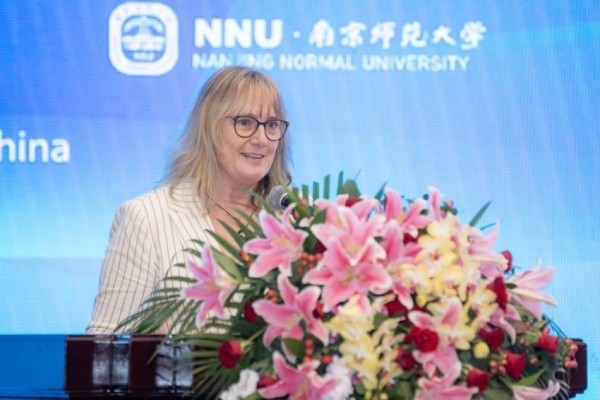
Dr Jane Ewens from the New Zealand Ministry of Education presents the Policy Overview.
This year’s symposium resulted in a range of valuable outcomes for New Zealand’s education relationship with China and for the sector. The symposium generated good visibility for New Zealand, with 45 media articles (accounting for almost four million views), which included reporting from top tier Chinese media. Many connections and leads for New Zealand participants were created during and after the symposium – one New Zealand speaker reported being approached by 50 Chinese counterparts after their virtual presentation.
Aside from the symposium, the New Zealand delegation’s key objectives included supporting a bilateral education initiative linked to the New Zealand-China Arrangement on Education Cooperation and Training, while showcasing New Zealand’s expertise in early childhood education practices and curriculum to audiences in China.
The visit provided a chance for the delegation to understand best practices in early childhood education from a Chinese cultural perspective that they could put into practice in New Zealand to better support learners from Chinese backgrounds. As part of the programme in Nanjing, the delegation visited two kindergartens and presented a panel session with academics and students at Nanjing Normal University.
If you are interested in the ECE Symposium or partnering with ENZ on this event in the future, please contact the ENZ China team at China@enz.govt.nz.
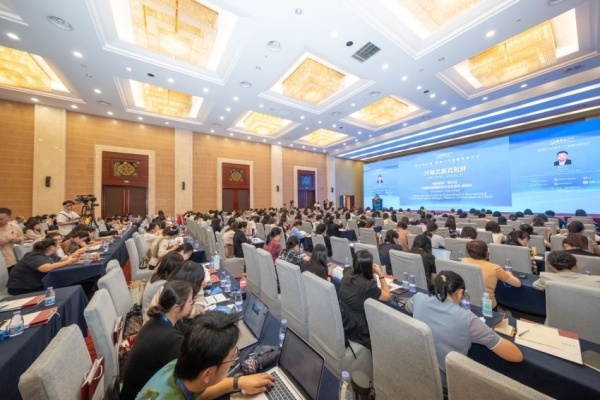
The audience in Nanjing take notes during the presentations.
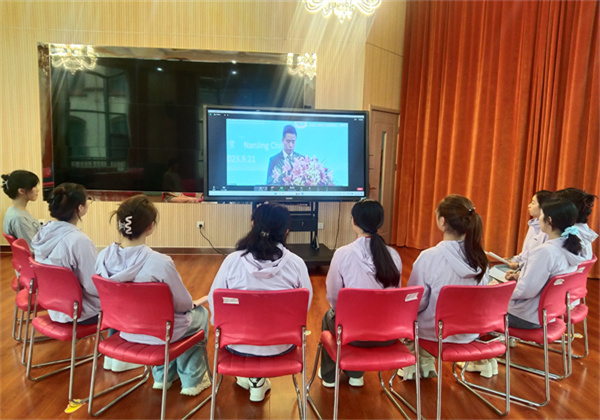
Attendees of the Hefei Shuangyou Education Group in Anhui Province watch the symposium online.
-
Come back to NZ! Nau mai hoki mai rā!
Education New Zealand Manapou ki te Ao (ENZ) is inviting New Zealand education providers to take part in an initiative to encourage students from Thailand who have previously studied here to return to New Zealand for further study. Providers are invited to subsidise travel for returning students - up to a maximum of NZD $3,000 for students returning for a year or more.
The scheme will work by students or agents providing proof of previous study and once the students are in New Zealand, can rebate the air fare back to their account through coordination with their agents. The amount students can rebate is based on the receipt of their booked travel but no more than the $3,000 cap. New Zealand schools who were involved in the recent education events in Thailand gave positive feedback on this concept.
ENZ will publicise the initiative online, via agents, the Ministry of Foreign Affairs and Trade, and media. Education agents will also be asked to co-promote this with us while KTC credit card, the scheme’s credit card partner, will be promoting this campaign and additional benefits through their own database and PR channels.
If you are an education provider interested in signing up or finding out more about the campaign, please click here.

